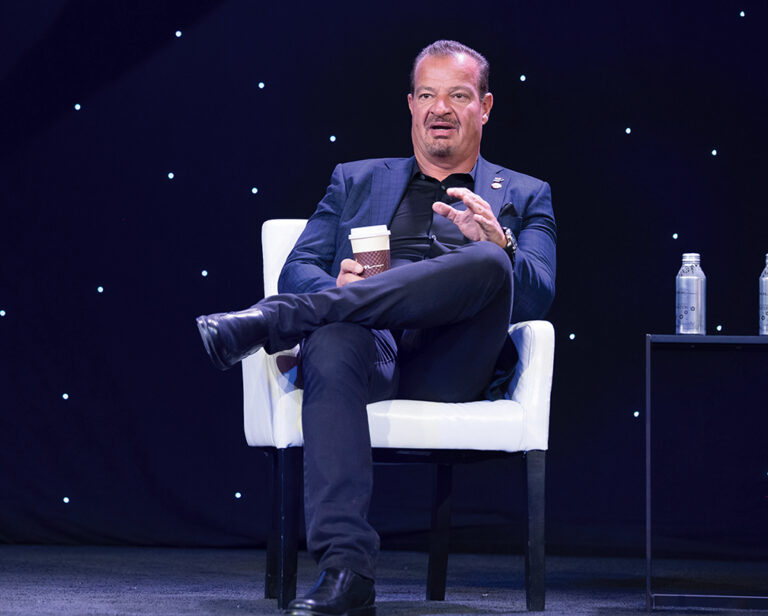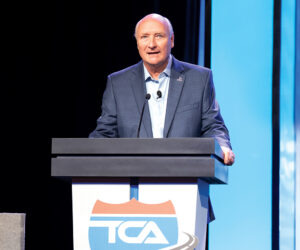It goes without saying, when referring to men and women who lead companies as chairman, president, CEO, or one of several other titles in the business world, that their job is full time. They face making decisions every day in areas such as finances, operations, and key personnel to name just a few. When one of these men and women are called to head up the board of directors of an industry association, some may think it’s a cushy job because it doesn’t involve much work or effort. That is absolutely not the case for the chairman of the Truckload Carriers Association (TCA). Not only are there association-sponsored meetings to attend, regular trips to meet with staff at headquarters in Virginia, phone calls to make, and e-mails to send — among other things, there’s knowledge to gain about industry issues. If you don’t believe the position is like a second full-time job, read on and see where Load One CEO and TCA Chairman John Elliott has been and where he’s going, along with his thoughts on key issues in trucking.
Mr. Chairman, when TCA members read this chat, you will have completed almost two-thirds of your term. It certainly has been a busy almost-nine months. What are some of the organization’s accomplishments since we last spoke, and what is on the agenda for the next couple of months?
TCA successfully held its Fall Business Meetings and Call on Washington event in September, which brought together our members to discuss association business and the issues most affecting membership. Attendees represented TCA and truckload on Capitol Hill, speaking with Congressional representatives and staffers to try and move the needle in addressing some of our top challenges. In addition, the organization is undergoing some big advancements that should translate into accomplishments and increase member value. We have developed some key task forces to further elevate some of our events and programs, like our annual meeting, driver of the year award, and more. Staffers at TCA are ramping up planning for next year’s slate of meetings — and poised, as ever, to deliver top-rate, must-attend events.
During your term, you’ve spent a lot of time traveling. What are your travel plans for the for the remainder of your term?
As an organization we are really in high gear, and the plan is to keep the pedal to the metal. The next few weeks will see our attendance at several key events. We have our Bridging Border Barriers event, the American Trucking Associations (ATA) Management Conference and Exhibition, a number of Truckload Profitably Program (TPP) seminars, and other industry events I will be attending or speaking at. I cannot forget about my personal and TCA support for Wreaths Across America. That’s just the balance of this year!
You previously mentioned the Fall Business Meetings and the Call on Washington. By all accounts, the two events were very successful. Please share some of the highlights, beginning with the Fall Business Meetings and followed by the Call on Washington.
They were a great success. Our visits on Capitol Hill were well received, and our congressional meetings helped us to continue to tell our story and highlight the critical issues that affect truckload. From truck parking to AB5, we stressed the critical nature that these issues have on our industry and continue to support the supply chain and economy. The Fall Business Meetings saw us advance our annual budget and committee initiatives to our board of directors.
TCA held its annual officers’ retreat was held this fall in Cancun, Mexico. What is the purpose of the retreat, and what were highlights of the meeting?
The annual retreat is really the time that the officers and executive staff focus on the upcoming year and the organization’s priorities and direction. We set the budget for presentation to the board of directors and reviewed several TCA programs and initiatives. TCA is a member-driven organization, and it’s the goal of the officers to provide our staff with clear direction and marching orders for the upcoming year. I think we succeeded very well this meeting in achieving these objectives.
We’ve heard there will be changes in the format of the annual TCA convention to be held next March in Orlando, Florida. What can you tell us?
That is a great question. I think it goes without saying that, as an association, we continually strive to make our member experience better — and the changes we are incorporating into our annual convention will demonstrate that. Our goal is to be able to provide our members with the opportunity to have their questions answered by those who have had similar experiences. The format this year aims to do exactly that. We are planning for more interaction, greater content, and speakers that can provide greater takeaways for everyone who attends.
The sixth annual Bridging Border Barriers meeting, where industry executives and key association leaders meet to discuss and learn about current and potential cross-border issues facing the industry, will be held November 17 in Mississauga, Ontario, Canada. Why is this event important and beneficial to members?
First and foremost, it is important to note that TCA is an international association. As such, we certainly want to embrace our Canadian members by providing them with quality content and networking opportunities north of the border rather than continuously having them travel south to experience this event in the U.S. The members who attend this event have continuously supported the meeting to the extent that it has grown year over year. An example of that is that we have outgrown the traditional location, so the meeting will be convened this year in a larger venue to accommodate more people. Our registration numbers for this year are certainly trending in the right direction and show that this meeting model has the propensity to grow tremendously.
The Senate recently confirmed Robin Hutcheson as administrator of the Federal Motor Carrier Safety Administration (FMCSA). She has been running the agency for several months as deputy administrator. What can you tell us about Ms. Hutcheson as she takes over this role?
I can say that Administrator Hutcheson is a very engaged and considerate leader. As part of our Call on Washington program, a number of TCA members and I recently met with her and her senior staff in D.C. I can say that she was very open to understanding our issues and concerns. She asks great questions and solicits industry feedback. I am highly optimistic she will be a great leader for the FMCSA and our industry, and I am looking forward to building upon the strong partnership that TCA has with the agency.
It appears the trucking industry’s effort to increase safe and secure parking for drivers is gathering steam. What’s the latest news on truck parking?
Truck parking — or the lack of safe and secure truck parking — has been a priority issue for TCA and its government affairs efforts. In fact, because of the efforts of staff and our lobbyists on Capitol Hill, we were successful in getting parking language into the House appropriations bill, a big win for TCA and its members — and certainly evidence that our members’ contributions toward TCA’s government affairs efforts are being well spent. The fight doesn’t end there, either. We continuously sound the horn on this issue, which resonates in both the House and the Senate as bipartisan talk continue to support dedicated dollars towards improving this national problem.
Two senators recently introduced the Trucking Regulations Unduly Constricting Known Service Providers bill, which would remove entry-level driver training requirements for small fleets. Do you believe this a good idea?
Great question. I think we can all agree that promulgating rules and regulations that pertain to the entire industry is the best for all involved. The entry-level driver training rule was designed to create minimum standards for anyone who trains prospective drivers to get their CDL. Yes, that even refers to the independent contractor that is looking to train a relative in that endeavor to eventually take over the business. In knowing that, the most sensible decision is one that leaves the regulation in place for all to follow, regardless of fleet size.
A federal judge recently ruled that Rhode Island’s truck-tolling system is unconstitutional. What is TCA’s reaction to this ruling?
We are extremely pleased with the court’s decision. The ruling that this is unconstitutional was a great victory for the trucking industry. The ATA, with the support of TCA, scored a great win. This helps send the message to other states that were contemplating any discriminatory tolling practice that the industry is prepared to fight the fight!
The FMCSA has chosen 16 women to serve on the inaugural Women of Trucking Advisory Board. Their goal is to recruit, retain, support, and ensure the safety of women CMV drivers. Is the industry making progress in its effort to recruit more women to trucking, particularly as drivers?
Progress is definitely being made, but with the numbers that say our industry’s driving force is made up of roughly 7% women, we really have nowhere to go but up. Obviously, attracting the female population to a career behind the wheel is one that every carrier strives for. Issues like safe and secure trucking parking certainly play a role in that, and that is just one particular example. We have opportunities across the board for every demographic that wants to enter our industry, and we continue to strive to make this profession one that welcomes everyone.
All 50 states have received final approval to begin construction on a nationwide network of electric vehicle charging stations, which will place one roughly every 50 miles along interstate highways. Where does the TCA stand on industry plans for zero-emissions Class 8 tractors?
TCA supports the notion that our industry is committed to protecting the environment by dedicating itself to reducing the pollutants that are emitted from our vehicles. We continue to work toward the goal of zero-emission vehicles, but we certainly are wary of the limits it places on over-the-road/long haul operations. We continue to support the development of equipment that would work in this kind of environment and have invested in additional efforts, outside of electric vehicles, that would adhere to pollution-reduction standards. As an industry, exploring other alternatives — such as propane and hydrogen — that can be incorporated into our fleets could present themselves to be a more practical solution.
The trucking industry, as well as other industries that rely on diesel equipment, is suffering from a shortage of technicians. What do you hear from TCA members about their ability to hire and retain qualified diesel techs?
Interesting, because we just addressed forward-looking, zero-emissions trucks, and now we are hunting high and low for technicians to be able to service them. The need for new technicians, who have been trained on today’s technology, is a growing concern for which we don’t yet have any concrete answers. I think it goes without saying that attracting potential individuals to this industry — diesel techs, drivers, or anyone searching for a rewarding career — should be exposed to trucking as early as possible. The growth of STEM classes in education curriculum could point perspective students toward this career, placing them at the forefront of technological advances of an industry that would benefit from them.
Mr. Chairman, on a personal note, please take a minute to share with members what the upcoming holiday season means to you and offer a word of greeting to TCA members.
The holiday season is really a time to reflect. The last few years of the pandemic, and most recently the devastation in Florida, only drives this simple fact home. We need to sometimes stop and think about what we have been through as a nation and how far we have come. So much seems to divide us at times, but in the end, we are a strong resilient nation. Nothing demonstrates this fact more than the way trucking steps up in times of need. From delivering and keeping this nation up and running during a pandemic to delivering desperately needed relief and recovery supplies — trucking exemplifies the best of us all.
Lyndon Finney’s publishing career spans over 55 years beginning with a reporter position with the Southwest Times Record in Fort Smith, Arkansas, in 1965. Since then he’s been a newspaper editor at the Southwest Times Record, served five years as assistant managing editor of the Arkansas Democrat-Gazette in Little Rock and from November 2004 through December 2019 served as editor of The Trucker. Between newspaper jobs he spent 14 years as director of communications at Baptist Health, Arkansas’ largest healthcare system. In addition to his publishing career he served for 46 years as organist at Little Rock’s largest Baptist church.














